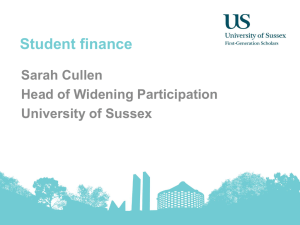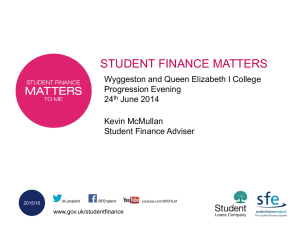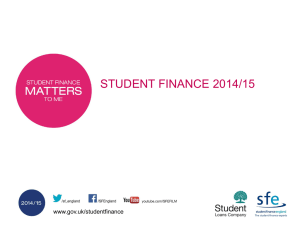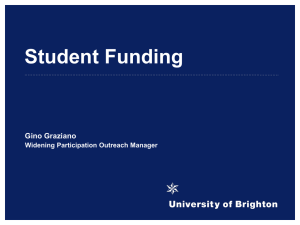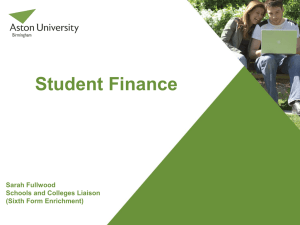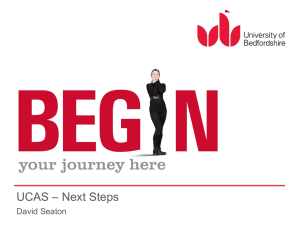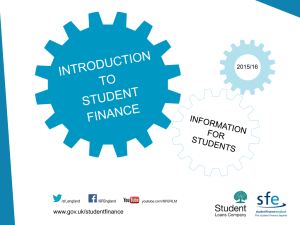Finance Pkg No Gra - Practitioners
advertisement
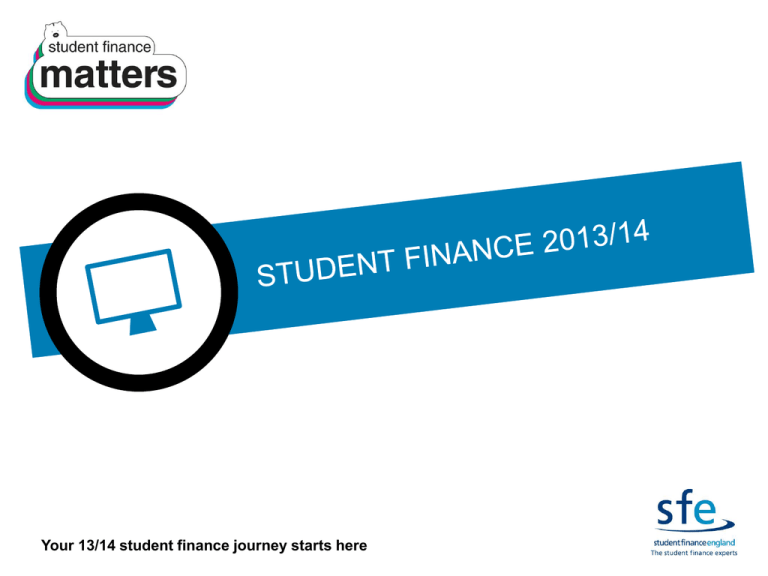
Your 13/14 student finance journey starts here • Student Finance Package • Repayment • Applications & Information • Questions & Comments Your 13/14 student finance journey starts here Tuition Fee Loan Maintenance (living cost) Support Scholarships & Bursaries Additional Support • Universities and higher-education colleges can charge new students a tuition fee level of up to £9,000 per year. • Eligible students won’t have to pay any tuition fees up front. • A Tuition Fee Loan (not dependent on household income) is available to cover the fee levels set by the university or college. (Up to £6,000 for publicly-funded courses at private HEIs) • The Student Loans Company pay any Tuition Fee Loan to the university/college directly in instalments across the academic year. • The loan is repayable, but linked to future earnings over £21,000 a year. • From September 2012 new part-time students can also apply for a Tuition Fee Loan. The amount they can get doesn’t depend on household income. • The maximum universities or colleges can charge for part-time courses is £6,750 a year. • Students starting designated part-time courses provided wholly by a private institution can apply for up to £4,500 in Tuition Fee Loan. • The amount charged will depend on the intensity of the course. (minimum 25% maximum 75%) • The loan is repayable, but linked to future earnings over £21,000 a year. Your 13/14 student finance journey starts here • The majority of the repayable Maintenance Loan will be available to all eligible students. 65% of the total loan is non-means tested. (Doesn’t depend on household income) • The amount of Maintenance Loan available will be linked to where the student lives and studies while in higher education. Full-year student 65% non means tested 35% means tested Maximum loan Parental home £2,843 £1,532 £4,375 Elsewhere £3,575 £1,925 £5,500 London £4,988 £2,687 £7,675 Overseas £4,247 £2,288 £6,535 ! Additional means-tested loan is available for each extra week of study for students attending their course beyond 30 weeks. • The maximum non-repayable maintenance grant level in 2013 is £3,354. • Unlike 100% of the tuition fee loan and up to 65% of the maintenance loan, the grant a student receives is solely dependent on household income levels. (100% means tested) Household income thresholds: • Students from households with income of up to £25,000 will be entitled to the maximum grant of £3,354. • Students from households with incomes of up to £42,611 will be entitled to a partial grant. Student living away from home, outside London 2013/14 Household income Maintenance Grant Maintenance Loan Total £25,000 & under £3,354 £3,823 £7,177 £30,000 £2,416 £4,292 £6,708 £35,000 £1,478 £4,761 £6,239 £40,000 £540 £5,230 £5,770 £42,611 £50 £5,475 £5,525 £42,875 £0 £5,500 £5,500 £50,000 £0 £4,788 £4,788 £60,000 £0 £3,788 £3,788 £62,125 & over £0 £3,575 £3,575 Your 13/14 student finance journey starts here Bursaries: • May be eligible for National Scholarship Programme • Linked to personal circumstances and often, income level • Vary by institution Scholarships: • Can be linked to academic results • Can be subject specific • Limited in numbers ! Check university websites and ask at open days for information on bursaries & scholarships – what’s available and how to apply. Your 13/14 student finance journey starts here You may get extra money or support if you: • have children or adults dependent on you • have a disability, mental-health condition, long-term health condition or specific learning difficulty • are studying an NHS* or Social Work course • *Includes: nursing, midwifery, physiotherapy, chiropody, dietetics, speech & language therapy, dental hygiene, medicine, dentistry, radiography and occupational therapy ! For more information on NHS and Social Work eligibility and funding students should visit: www.nhsbsa.nhs.uk/students Your 13/14 student finance journey starts here • Repayments don’t start until the student is earning at least £21,000 a year (£1,750 a month) gross. • Full-time students will begin to repay in the April after graduating from or leaving their HE course. (after 2016) • Part-time students can begin to repay in the April 4 years after they’ve started their course. (if earning over £21,000 a year) 12_13 • If income falls to £21,000 or below repayments will be suspended. • Repayments will be 9% of income over £21,000 and will be deducted from salary through the HMRC tax system for most students. Yearly income before tax ! Income from which Approximate monthly 9% will be deducted repayment £21,000 £0 £0 £25,000 £4,000 £30 £30,000 £9,000 £67 £35,000 £14,000 £105 £40,000 £19,000 £142 £45,000 £24,000 £180 £50,000 £29,000 £217 £60,000 £39,000 £292 Any outstanding loan balance will be written off 30 years after entering repayment. The interest charged will vary during study and depending on earnings after graduation: During study until entering repayment Earnings: Below £21,000 ! Interest rate: Retail Price Index (RPI) +3% Interest rate: Set at RPI Only Earnings between: £21,000 - £41,000 RPI plus some amount between 0% and 3% Earnings: Above £41,000 Interest rate: Retail Price Index (RPI) +3% Students can make extra voluntary repayments at any time without penalty. Your 13/14 student finance journey starts here • Students should apply as soon as possible to make sure they have their money at the start of their course. • Applying online through GOV.UK is the quickest and easiest way. • No need to wait for a confirmed offer from a university, but we need to know right away if anything changes. (uni, course or personal details) 12_13 • Make sure any required evidence is sent straight away to support applications. • In most cases this will be details supplied during the application , with no need for original documents to be sent, including: • Valid UK passport number (for student identity) • National Insurance numbers (student & parents’ for income details) https://www.gov.uk/studentfinance http://www.studentfinanceengland.co.uk/ • The process of applying for student finance can be made even easier by allowing UCAS to share some of your application details with the Student Loans Company. • Request a reminder and UCAS will prompt you to log in to your account and agree to share details with SLC when the student finance online application launches. • Your student finance application will be pre-populated with information from your UCAS application, such as personal and course details. • This makes applying for a student loan faster and saves entering the same info on both forms. www.facebook.com/SFEngland www.twitter.com/sf_england www.unistats.com • Plan a budget – and stick to it! (dull, but practical) • Ask questions and get advice from teachers, advisers current/former students, parents/older brothers & sisters. • Check out student bank accounts but try to avoid taking credit or store cards. • If you need financial support and advice once you’re at university, staff there will be able to help. 3 12_13 12_1 • Beware of phishing scams!! • It’s important to make the right university and course choice, not letting fee levels affect your decision. Future repayments are linked to what a student earns, not what they borrow. • Research all finance available – especially bursaries & scholarships. • Apply online & on time – no need to wait for a confirmed place. • Apply for DSAs or other additional support as soon as possible. 12_13 • Ensure all details are correct before submitting an application, and let us know of any changes as soon aspossible. www.slc.co.uk/teacherspets Your 13/14 student finance journey starts here For further information on student finance and applications call SFE on: Customer helpline: 0845 300 5090 12_13 There’s no silly questions when it comes to student finance, so if you’re unsure, ask! @sf_england facebook.com/SFEngland
